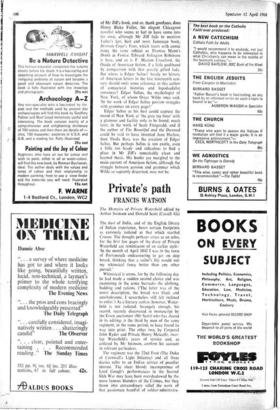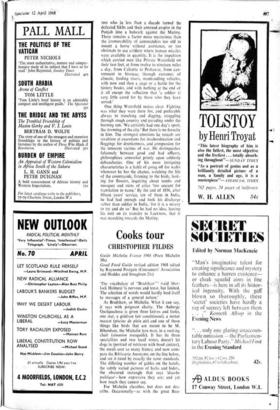Private's path
FRANCIS WATSON
The dust of India, and of the English library of Indian experience, bears certain footprints as curiously isolated as that which startled Crusoe. The thought perhaps arises as an echo, for the first few pages of the diary of Private Waterfield are reminiscent of an earlier style: `In the month of April 1842 I was in the town of Portsmouth endeavouring to get on ship board, thinking that a sailor's life would suit my whimsical fancy better than any other pursuit.'
Whimsical it seems, for by the following day he had made a sudden second choice and was examining in the army barracks the clothing, bedding and rations. (`The latter was of the worst description, the bread was black and unwholesome. I nevertheless still felt inclined to enlist.') As a literary ranker, however, Water- field is not isolated. Strangely enough, his record, recently discovered in manuscript by the Essex auctioneer (Mr Scott) who has shared in its editing, is the third by men of the same regiment, in the same period, to have found its way into print. The other two, by Corporal John Ryder and Private Henry Metcalfe, over- lap Waterfield's years of service and, as collated by Mr Swinson, confirm his account in relevant particulars.
The regiment was the 32nd Foot (The Duke of Cornwall's Light Infantry) and all three diaries refer to an Indian _service of peculiar interest. The sheer bloody incompetence of Lord Gough's performances in the Second Sikh War may have been overshadowed by the more famous blunders of the Crimea, but they throw into extraordinary relief the work of that passionate handful of soldier-administra-
tors who in less than a decade turned the defeated Sikhs and their annexed empire in the
Punjab into a bulwark against the Mutiny.
There remains a factor more mysterious than the irremovability of commanders too old to mount a horse without assistance, or too obstinate to use artillery where human missiles were available in quantity. It is the impulsion
which carried men like Private Waterfield on their two feet, at from twelve to nineteen miles a day, from Calcutta to Peshawar, from can- tonment to bivouac, through extremes of climate, fording rivers, manhandling vehicles, with now and then a siege or a battle for the history books, and with nothing at the end of it all except the reflection that 'a soldier is very little cared for by those who they have served.'
One thing Waterfield makes clear. Fighting was what they were there for, and preferable always to trenching and digging, struggling through rough country and parading under the burning sun. 'We certainly had one day's sport, the storming of the city.' But there is no ferocity in him. The strongest emotions he reveals are revulsion at executions for insubordination and floggings for drunkenness, and compassion for the innocent victims of war. He distinguishes fulsomely between good and bad officers, philosophises somewhat primly upon soldierly debaucheries. One of his most intriguing characteristics is a habit of going off for walks whenever he has the chance, watching the life of the countryside, listening to the birds, look- ing for flowers, inquiring about tombs and mosques and ruins of cities 'too ancient for translation to name.' By the end of 1856, after fifteen years' service, ten of them in India, he had had enough and took his discharge rather than soldier in India, 'for it is a misery to try and do so.' But he had no idea, leaving his unit on its transfer to Luck now, that it was marching towards the Mutiny.











































 Previous page
Previous page